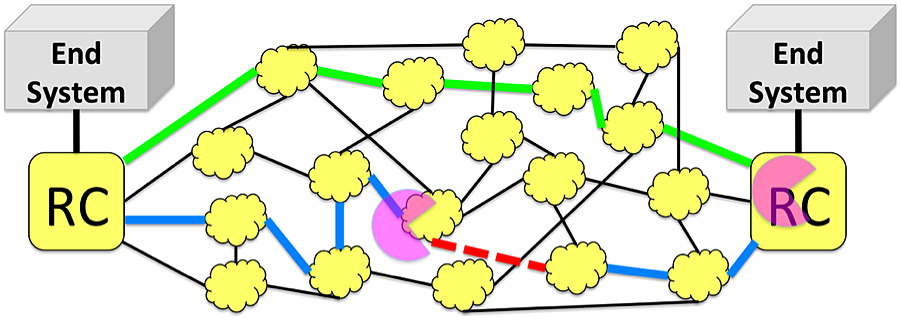Purdue-led team demonstrates innovative app at event hosted by Mozilla, National Science Foundation
June 25, 2013
 |
|
An app led by a Purdue team, built using the NSF's GENI platform for network experimentation, is designed to address the lack of reliable real-time communication for industrial and medical facilities via the Internet. This diagram of the app shows multiple paths of the communication where one packet stopped at a failed link and a second was received normally. (Purdue University image) |
WEST LAFAYETTE, Ind. - A team of researchers and industry partners led by Purdue University is demonstrating its software-defined network protocol computer software designed to improve communication between manufacturing and medical facilities at the Mozilla Ignite Challenge this week in Chicago.
Mozilla Ignite, hosted by Mozilla, the creator of the Firefox browser, and the National Science Foundation, is an open innovation challenge on June 24-26 through the federal government's US Ignite initiative. Its goal: imagine and build apps that show the full potential of next-generation networks in areas such as health care, education, energy, manufacturing and public safety.
The Reliable Communication Protocol, being developed in the lab at Purdue and on the NSF's GENI platform for network experimentation, addresses the lack of reliable real-time communication for industrial and medical facilities via the Internet.
Such communication is needed for tasks including remote medical procedures, the control of robots used to clean up after a chemical or nuclear disaster, and the control of manufacturing processes, said team leader George Adams, director of the ManufacturingHUB.org at Purdue.
"Our work will provide ultra-high reliability for critical applications," Adams said. "Rather than incorporating reliability into a single application, we are building a fundamentally new communication technology that can be used by any application."
The Purdue-led app team won a silver award in the Brainstorming Round of the Mozilla Ignite Challenge ($2,500) in a competition with more than 360 brainstorming entries. In the subsequent three development rounds of the event, the team was awarded funding at the highest level to demonstrate its concept.
US Ignite, a host for the competition, had invited the team to present its app idea in March at a Federal Communications Commission workshop on Gigabit Community Broadband Networks in Washington, D.C.
Joining Adams on the Purdue team are distinguished computer science professor Doug Comer and computer science graduate students Rajas Karandikar and Bhaskar Sarma. Other team members are:
* Department head and computer science professor John Geske, and computer science undergraduate student Alison Chan from Kettering University in Flint, Mich.
* Judi Clark, Jim Morrison and Pat Kennedy of Lit San Leandro, a 10-gigabit per-second metropolitan fiber project in the manufacturing zone of San Leandro, Calif.
* Tracy McSheery, Greg D'Andrea and Dmitry Derevyanko of PhaseSpace Inc., an optical motion capture technology firm in San Leandro, Calif.
* Ernest Howland of the Omnom Project, a startup developing an all-in-one, 3D printing and plastic recycler and filament manufacturer in Hayward, Calif.
* Ralf Muehlen, cluster engineer with Internet Archive in San Francisco.
Professor Comer said Mozilla Ignite was the catalyst that prompted the Purdue group to form a team and focus on addressing this communication issue for industry using an innovative app.
"We engaged students to help develop the underlying technology. More important, the challenge connected universities, a gigabit city, and industrial partners to construct a practical and effective demonstration that spans the country," he said.
Created by the White House Office of Science and Technology Policy and the National Science Foundation, US Ignite is designed to foster the creation of next-generation Internet applications that provide transformative public benefit. The applications are focused in six areas: Education & Workforce, Energy, Health, Public Safety, Transportation and Advanced Manufacturing.
ManufacturingHUB.org, which is powered by Purdue's open source HUBzero platform for scientific collaboration, serves small- to medium-sized manufacturers that could use high-performance computing and simulation to innovate new products but face barriers such as the cost of commercial software licenses, the cost of powerful computers and the staff to manage them, and the difficulty of learning to use complex simulation tools.
Writer: Phillip Fiorini, 765-496-3133, pfiorini@purdue.edu
Sources: George Adams, 765.494.2698, gba@purdue.edu
Douglas Comer, 765-494-6009, comer@cs.purdue.edu
Related websites:
Purdue Department of Computer Science: http://www.cs.purdue.edu/
Discovery Park: http://www.purdue.edu/discoverypark/

